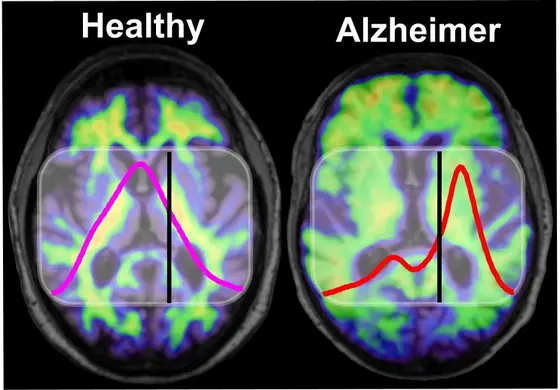There is as yet no cure for Alzheimer's disease. It is often argued that progress in drug research has been hampered by the fact that the disease can only be diagnosed when it is too late for an effective intervention. Alzheimer's disease is thought to begin long before patients show typical symptoms like memory loss. Scientists have now developed a blood test for Alzheimer's disease and found that it can detect early indicators of the disease long before the first symptoms appear in patients. The blood test would thus offer an opportunity to identify those at risk and may thereby open the door to new avenues in drug discovery.
One of the hallmarks of Alzheimer's disease is the accumulation of amyloid-β plaques in the patient's brain. The blood test, developed by Klaus Gerwert and his colleagues at the Ruhr University Bochum, Germany, works by measuring the relative amounts of a pathological and a healthy form of amyloid-β in the blood. The pathological form is a misfolded version of this molecule and known to initiate the formation of toxic plaques in the brain. Toxic amyloid-β molecules start accumulating in the patients' body 15-20 years before disease onset. In the present study, Gerwert and colleagues addressed whether the blood test would be able to pick up indications of pathological amyloid-β in very early phases of the disease.
The researchers first focused on patients in the early -so called prodromal- stages of the disease from the Swedish BioFINDER cohort. They found that the test reliably detected amyloid-β alterations in the blood of participants with mild cognitive impairment that also showed abnormal amyloid deposits in brain scans by PET imaging.
In a next step, the scientists investigated if their assay was able to detect blood changes well ahead of disease onset. They used data from ESTHER, a cohort study in Saarland Germany, led by Hermann Brenner (DKFZ) and conducted in collaboration with the Saarland Cancer Registry. The researchers compared blood samples of 65 participants that were later diagnosed with Alzheimer's disease with 809 controls. The assay was able to detect signs of the disease on average eight years before diagnosis in individuals without clinical symptoms. It correctly identified those with the disease in almost 70% of the cases, while about 9% of true negative subjects would wrongly be detected as positive.
Currently available diagnostic tools for Alzheimer's disease either involve expensive positron emission tomography (PET) brain scans, or analyze samples of cerebrospinal fluid that are extracted via lumbar puncture. The researchers suggest that their blood test serves as a cheap and simple option to pre-select individuals from the general population for further testing by these more invasive and costly methods to exclude the falsely positive subjects.
The blood test developed by Gerwert and colleagues uses a technology called immuno-infrared sensor to measure distribution of pathological and healthy structures of amyloid-β. The pathological amyloid-β structure is rich in a sticky, sheet-like folding pattern that makes it prone to aggregation, while the healthy structure is not. The two structures absorb infrared light at a different frequency, allowing the blood test to determine the ratio of healthy to pathological amyloid-β in the sample.
Andreas Nabers, Laura Perna, Julia Lange, Ute Mons, Jonas Schartner, Jörn Güldenhaupt, Kai-Uwe Saum, Shorena Janelidze, Bernd Holleczek, Dan Rujescu, Oskar Hansson, Klaus Gerwert, Hermann Brenner.: Amyloid blood biomarker detects Alzheimer's disease.
EMBO Molecular Medicine, 2018, DOI: 10.15252/emmm.201708763
